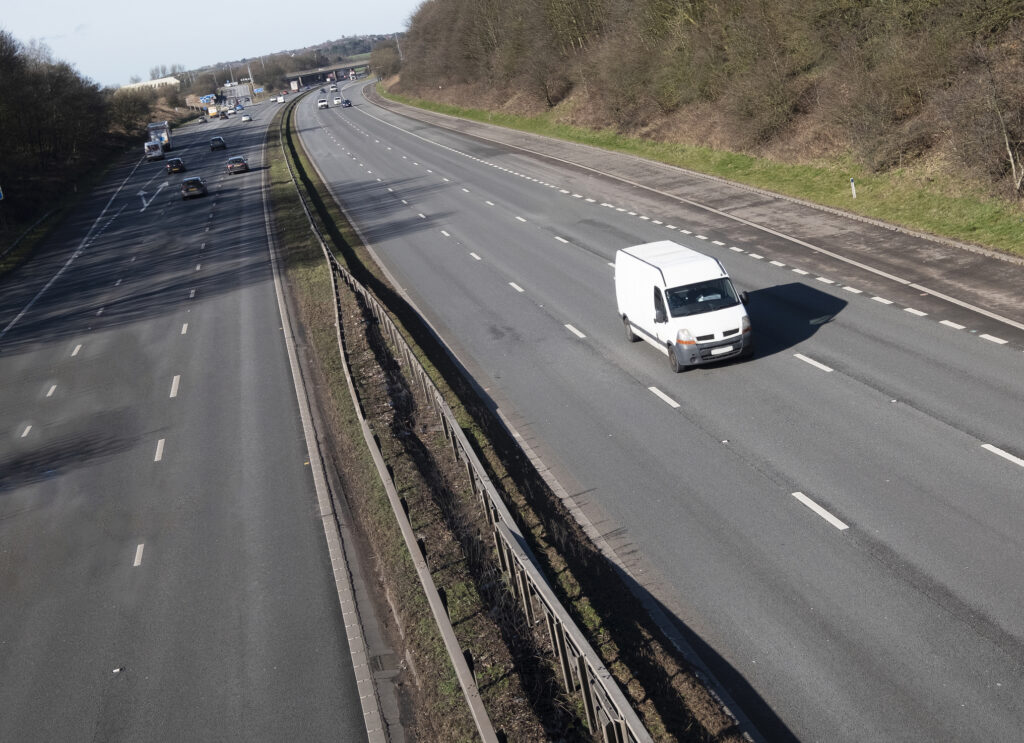Light-commercial vehicle registrations fall again in the UK
12 August 2024

July saw registrations of new light-commercial vehicles (LCVs) fall again in the UK while first-time conversion rates improved. Andy Picton, chief commercial vehicle editor at Glass’s (part of J.D. Power) examines the trends with Autovista24 editor Tom Geggus.
The UK’s new-LCV market declined by 8.5% in July with 24,689 vehicles hitting the roads. A total of 202,309 units were registered in the year to date. This is up 2.7% on the 196,916 deliveries recorded at the same point last year. It made for the best January to July since 2019 when 222,280 LCVs took to the roads.
Demand dipped across most segments in July according to data from the Society of Motor Manufacturers and Traders (SMMT). Registrations of pickups and vans between 2.5 and 3.5 tonnes of gross-vehicle weight (GVW) fell by 5.1% and 12.0% respectively. The latter’s 16,814 units represented 68.1% of all deliveries in the month. However, this was the sector’s third successive month of decline. Vans weighing between 2 and 2.5 tonnes GVW also dropped by 8.4% to 4,036 units.
The only segment to see growth in the month was vans weighing below 2 tonnes GVW. This weight category saw registrations increase by 117.6% year on year. Yet, this only resulted in 929 registrations, compared with 427 units in July 2023.
Specifications and sales
In recent years, registrations of entry-level models have fallen in favour of those with higher specification levels. Venson Automotive Solutions revealed that up to 40% of its supplied LCVs tend not to feature base specification levels. This includes air conditioning, parking sensors, power-folding wing mirrors and reversing cameras.
Duty of care and driver welfare are cited as the major reasons for this shift. The latest vehicles now offer a safer and more comfortable driver experience. The pickup sector attracts a different kind of buyer, however, typically demanding higher car-like specifications. These base models attract up to 10% of registrations.
Ford in front
Ford registered more LCVs than any other manufacturer in July, accounting for nearly 52.7% of all deliveries in the top ten. The Transit Custom claimed the top spot thanks to 3,718 units, with the Transit in second reaching 1,744 registrations. The Ranger pickup finished fifth with 1,345 deliveries and the all-new Transit Courier came tenth with 708 units.
The run-out of the current Volkswagen (VW) Transporter 6.1 has caused an increase in purchase deals. This allowed the model to finish third, recording 1,413 registrations. Meanwhile, with the Mercedes-Benz Sprinter claimed fourth (1,354 units).
Registrations from the Stellantis ProOne stable made up 19.6% of top-ten total. The Vauxhall Vivaro came sixth (1,225 units), the Vauxhall Combo eighth (844 units) and the Citroen Berlingo ninth (735 units). Meanwhile, the Renault Trafic claimed seventh with 1,178 units.
Electric vans low on power
There are now 28 different all-electric LCVs for fleets to choose from in the UK. Despite this battery-electric van registrations were down 8.1% compared to July 2023.
A total of 1,368 all-electric units weighing up to 3.5 tonnes GVW were registered in July 2024, compared with 1,489 deliveries 12 months ago. However, the powertrain increased its market share, representing 5.5% of registrations in the month, up 1.2 percentage points (pp).
In the first seven months of 2024, 9,721 all-electric units were registered. This was down 5.5% across the same period of 2023, with 10,292 registrations recorded. Battery-electric vehicles (BEVs) made up 4.8% of LCVs registered in the first seven months of the year, down 0.4pp.
These levels are well below the zero-emission vehicle (ZEV) mandate target. Manufacturers must ensure that 10% of all new LCVs sold this year emit zero emissions at the tailpipe.
The current figures reflect the extent of the industry’s struggles to adapt. A lack of a van-specific charging network is a particular point of concern. Cost is also a major issue, which could become even worse if the plug-in van grant is discontinued after April 2025.
The SMMT has lowered its expectations of how all-electric LCVs will perform in the UK by the end of 2024. The body forecasts that BEVs will make up 6.6% of LCV registrations (under 3.5 tonnes GVW) by the end of this year. This is down from 8.3% in earlier forecasts. The 2025 outlook has also been scaled back from 13.4% to 12%.
Vauxhall boosted
Vauxhall was the UK’s best-selling battery-electric van brand in July, registering 296 all-electric units. It claimed a 21.6% share of the electric market in the month. Meanwhile, Peugeot claimed second with 261 deliveries and a 19% share. Third place went to VW with 193 units (14.1% share). Mercedes-Benz was fourth with 180 registrations (12.9% share) and Ford came fifth with 119 units (5.8% share).
By range, 266 new Vauxhall Vivaro Electric LCVs hit the road in July. In second, Peugeot registered 229 e-Expert LCVs and the VW ID.Buzz Cargo van came third with 193 deliveries. The Mercedes-Benz eVito placed fourth with 142 new units and the Nissan Townstar EV finished fifth with 91 registrations.
The remaining top ten spots were filled by the Ford E-Transit (80 units), and the Renault Kangoo E-Tech (79 units). Then came the Toyota Proace City Electric (41 units), Mercedes-Benz eCitan (34 units) and the Peugeot e-Partner (32 units).
In the year to date, only four manufacturers appeared on track to meet the 10% ZEV mandate target for 2024. With a small volume of 29 units, BYD reached 100% ZEV sales. Then came Maxus and Peugeot, both with 12.3%, followed by Nissan with 11.8%.
Vauxhall (8.7%), Toyota (6.7%) and VW (6.5%) all seemed to be moving in the right direction. Meanwhile, Renault (5.7%), Citroen (5.3%) and Mercedes-Benz (4.6%) still need to make up ground.
Used sales volumes up
With the general election over, buyers have been back out in strength, all keen to purchase the best available stock. This led to improved first-time conversion rates in July.
Nevertheless, more used stock is now available than at any time over the last five years. This has resulted in average selling prices falling nearly 11.2% since the end of last year. However, prices are still 22.1% higher than before the 2019 pre-pandemic average.
Last month saw higher overall sales volumes, which were up 21.3% on June and 22.5% on July 2023. Euro 6 models made up 76.3% of all vehicles sold at auction, averaging 56.1 months of age. The average mileage of these vehicles increased to 75,063 miles (120,802km) from 73,708 miles in June. The average selling price fell by just over £200 (€233) to £8,817.
Electric vans continued to underperform, accounting for just 1.1% of the overall market. The average age of these vehicles was 87.6 months, up 2.6 months. These models increased their average mileage by over 3,200 miles to 46,792 miles. Average selling prices fell by over £750 over the month to just under £4,300. Euro 5 stock made up the remaining 22.6% of sales, up 3.3% on the previous period.
Stock age increases
Between June and July, the average age of sold stock increased from 74 months to 79.8 months. However, this was 3.6 months younger than in July 2023. Month on month, the average mileage of stock sold increased by 2.1% to 82,306 miles. Year on year, average mileage increased by 3%. Overall average sales prices fell by 5.9% over the month and 14.5% over the last 12 months.
Medium vans remained the most popular LCV type, accounting for 37.1% of all auction sales in July. Large vans made up 25.5% of the market, while small vans represented 24.1%. 4x4 pickup models took a 13.3% share, down 0.5 percentage points (pp).
The average sale price was £12,267, down 4.4% on June. Large vans covered more distance than any other vehicle type at an average of 91,274 miles. This was up nearly 1,250 miles on the previous month but down over 1,225 miles on 12 months ago.
Conversation rates improve
First-time conversion rates improved by 2.2pp to 71.6% in July but fell 3pp on the same point last year. Broken down, the best conversion rates were achieved by medium vans at 74.9% (up 4.6pp on June). Meanwhile, the 4x4 pickup segment saw the lowest conversion rate, as it fell by 3pp to 65.6%.
Used vehicles observed for sale in the retail market increased by 0.85% to just over 46,300 units. Of these, 94.3% were diesel models, 3.2% were BEVs, 1.84% were petrol and 0.38% were plug-in hybrids. Of all vehicles on sale, 39.1% were valued at £20,000 or more, while 38.1% were sold for between £20,000 and £10,000.
At the lower end of the market, vehicles in the £10,000 to £5,000 price bracket made up 18.3% of the overall market. Meanwhile, 4.5% of models were on sale for less than £5,000. The average age of all vehicles remained unchanged at 55 months, while the average mileage fell by 3.1% to nearly 56,550 miles.



